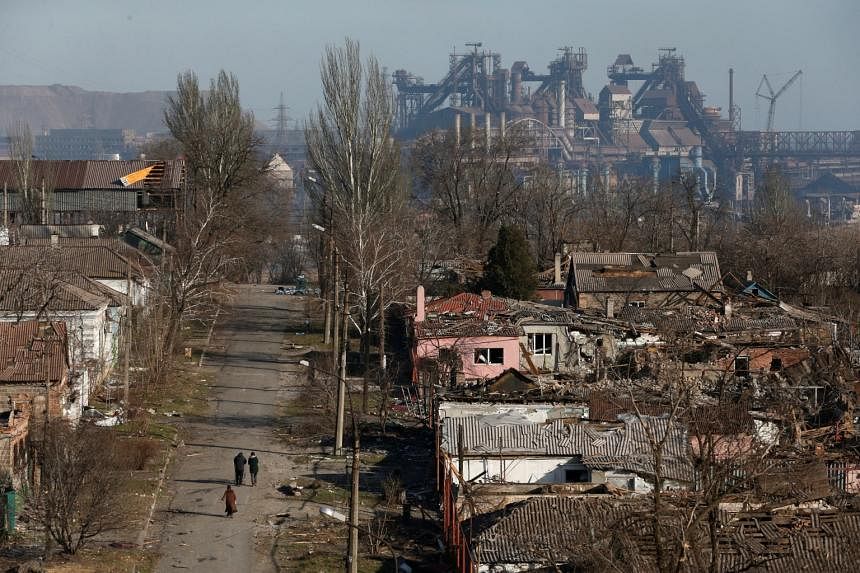LONDON (BLOOMBERG, REUTERS) - The Pentagon says it's monitoring claims that Russian forces deployed a poisonous substance in the besieged eastern Ukrainian city of Mariupol, which if confirmed as a chemical weapon could further escalate the war.
Yet clarity will be difficult to achieve. The allegations were made by members of the Azov battalion, a right wing militia folded into Ukraine's National Guard that has been part of Mariupol's defence and has now retreated to the city's vast steel factory, Azovstal, to mount a final stand.
The group posted video footage of some soldiers and a civilian suffering effects they said included flushed faces, heartburn, inflamed mucous membranes and dryness of the eyes. One soldier said he saw white smoke and immediately suffered tinnitus and extreme weakness, barely making it the 10m back to shelter. There, he said, the ventilation system brought the same smoke and symptoms to people below.
Yet, with the factory under fire and cut off by Russian troops, it would be difficult to secure environmental or biomedical samples for testing. Those would be needed to determine what may have poisoned the people, according to Dan Kaszeta, a chemical weapons expert who served in the US Army Chemical Corps and later as adviser to the US president's office on chemical and biological weapons preparedness.
"It's basically impossible to rely on just a witness account and symptoms," Kaszeta said.
Those sentiments were echoed on Wednesday (April 13) by Ukrainian President Volodymyr Zelensky. He said it was not possible to draw 100 per cent firm conclusions.
Ukraine's Deputy Defence Minister Hanna Malyar said in televised remarks that the incident was being investigated, but that a preliminary assumption was that phosphorous bombs - gruesome weapons not classed as chemical - may have been responsible.
Confirming a chemical weapons strike could have significant consequences. US and European officials have said that any Russian use of banned substances in Ukraine would meet with an immediate reaction.
"The use of chemical weapons will get a response and all options are on the table for what that response could be," James Heappey, Britain's minister for the armed forces, said on Tuesday on BBC radio. He declined to answer whether those options would include direct intervention in the war.
Nato states have said so far they will not send troops into Ukraine, or deploy a no-fly zone over the country, out of concern it could drag them into a direct confrontation with Russia and see the war spiral into a broader conflict.
Having inherited a 40,000 tonne chemical weapons stockpile from the former Soviet Union, the Russian government said in 2017 it had destroyed them all. Still, other nations have accused it of deploying chemical weapons several times since, something Moscow has denied.
A senior US defence official told reporters at the Pentagon that the US couldn't confirm the use of chemical weapons and was monitoring the situation. The official said any incident may have been as limited as the use of tear gas, or may have been more widespread.
"We have credible information that Russian forces may use a variety of riot control agents" to incapacitate Ukrainian fighters and civilians in the city, US Secretary of State Antony Blinken said at a news briefing. But he too said he couldn't confirm allegations that Russia already had used chemical weapons in Ukraine.
Events have been further muddied by a spokesman for the self-proclaimed Donetsk People's Republic or DNR, Eduard Basurin, who said just hours before the alleged attack that Russian forces should "smoke" the Azov battalion out of the factory.
After the Azov battalion made their claim, Basurin denied any chemical attack had been made. DNR forces are fighting alongside regular Russian troops in the effort to take Mariupol.
Another complicating factor is that Azovstal has numerous toxic substances that, if struck by munitions, could also make people sick.
Azovstal's staff spent the first days of the war shutting down furnaces and removing stocks of ammonia, a particular risk, Yuriy Ryzhenkov, chief executive officer of Metinvest Holding, which owns the plant, said in an interview last month.
Ryzhenkov also said the plant had a number of secure bunkers that, at the time, were housing about 4,000 staff and family members. All had been pre-stocked with food and water in anticipation of a siege.
Some civilians have since been evacuated, while the Azov battalion has turned the plant into a fortress, making use of its bunkers. That could also explain why both soldiers and civilians suffered effects from the same attack, whether with chemical or conventional munitions.
Earlier on Tuesday, Kaszeta published a lengthy Twitter thread where he set out reasons for caution in assuming use of chemical weapons.
"Let's look at the place. It's a steelworks. There's lots of scope in an industrial setting for conventional or incendiary weapons to cause chemical problems because of fires and explosions," Kaszeta tweeted, before going on to say he could see little military reason for making such a small chemical weapons strike.
"Surprisingly, regardless of the thousands of civilians killed by the Russians in Mariupol, everyone began to talk about us only after the chemical weapons attack," said an Azov battalion member speaking in the video. "But the city is daily attacked by aircraft, navy, heavy flamethrower systems, artillery and phosphorous munition."

